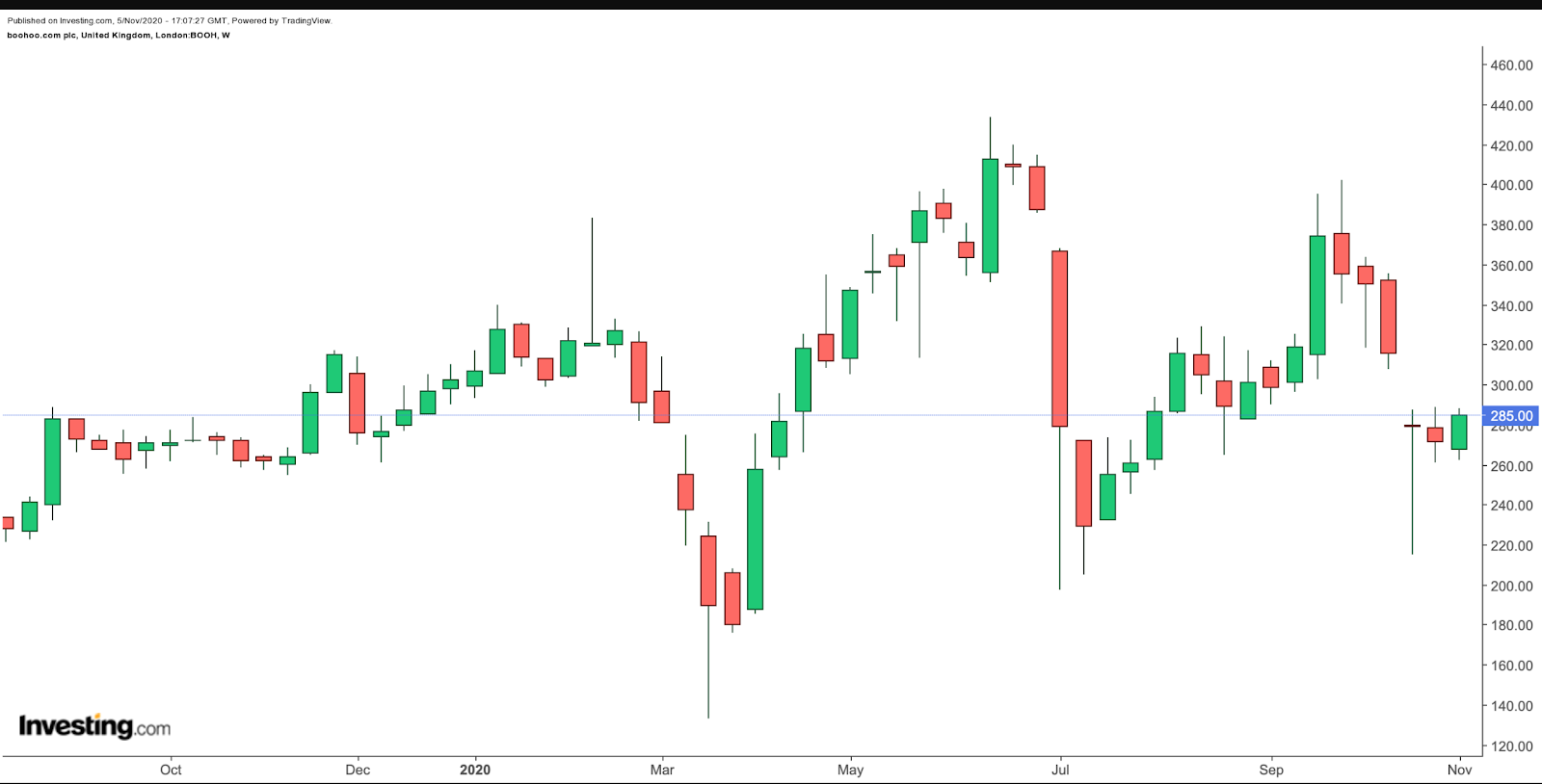The COVID-19 pandemic has affected numerous sectors of the economy, including retailers. The spring months saw lockdowns in many countries, which included the closure of non-essential shops. Even those retailers with online e-commerce presence suffered as the pandemic's initial shock affected the consumer psyche and wallet.
In the US, share prices of many retailers have since recovered, along with many other stocks in different sectors. For instance, year-to-date (YTD) the Dow Jones Retailers is up over 38%.
However, the improvement in retails stocks has, for the most part, not happened in the UK. Here is how the shares of several FTSE retailers have fallen since the start of the year.
- boohoo.com (LON:BOOH) (OTC:BHOOY): down 5%;
- Burberry (LON:BRBY) (OTC:BURBY): down 35%;
- JD Sports Fashion (LON:JD): down 15%—not to be confused with the Chinese e-commerce giant JD.Com (NASDAQ:JD);
- Next (LON:NXT) (OTC:NXGPY): down 11%
One retailer that has had good a strong year so far is ASOS (LON:ASOS) (OTC:ASOMY). The shares are up over 35% YTD.
According to the UK's Office for National Statistics, (ONS):
"In September 2020 retail sales volumes increased by 1.5% when compared with August; this is the fifth consecutive month of growth, resulting in an increase of 5.5% when compared with February's pre-pandemic level."
The official numbers further show that:
“in the three months to September, retail sales volumes increased by 17.4% when compared with the previous three months; this is the biggest quarterly increase on record as sales picked up from record-low levels experienced earlier in the year."
Put another way, most retailers saw significant improvement when the earlier lockdowns during the spring months ended in the summer.
On Nov. 5, the UK began another lockdown, and non-essential stores will be shut for almost a month. However, we believe the potential adverse effect of the revenue hit has already been factored into most retail shares.
Markets are always forward-looking. As the UK gets ready to enter the normally-busy shopping season leading up to Christmas and the New Year, many analysts concur that beaten-down retail stocks could well deserve a closer look. Let's now see if BOO stock is one of them.
Boohoo
The Manchester-based member of the FTSE 250 Index started trading in 2014 at an opening price of 70p. On Nov. 5, shares in Boohoo closed at 285p ($68.90 for US-based shares).
Thus over the years, the shares have created shareholder value.
BOO stock started 2020 around 300p. By mid-March, it was below 160p. To the delight of investors, the shares went over 400p in early July. However, then came newspaper headlines about the working conditions at some of its UK-based suppliers, where workers were allegedly paid less than the legal minimum wage.
Investors were not forgiving. By mid-July, the shares tanked to 210p. Since then, management has commissioned an independent inquiry. The company has also said it would take a more proactive role in managing the supply chain.
In late September, the group announced trading results for the six months ended Aug. 31. The retailer saw a 45% in revenue and a 51% increase in pre-tax profit, which meant shoppers were not overly concerned about the adverse news headlines. Management also raised full-year guidance.
We regard corporate governance issues in public companies to be of the utmost importance. However, Boohoo's management will likely do its best to avoid such a compromising situation again. Therefore, we are cautiously optimistic about the stock for the rest of the year. Long-term investors may consider buying the dips.
Bottom Line
The pandemic brought fundamental changes in consumer spending behaviour. For example, globally e-commerce now has a strong tailwind that will possibly stay with us in future quarters too.
Yet, even before 2020, many retailers re-organized their operations, especially to incorporate more online sales. It would be hard to deny the effect of the online giant Amazon (NASDAQ:AMZN) on other retailers both in the U.S. and worldwide.
According to the US Census Bureau of the Department of Commerce:
"the estimate of U.S. retail e-commerce sales for the second quarter of 2020 ... was $211.5 billion, an increase of 31.8 percent (±1.2%) from the first quarter of 2020... E-commerce sales in the second quarter of 2020 accounted for 15.1 percent of total sales."
In the UK, the ONS reported that in September 2020:
"The proportion of online sales was at 27.5%, compared with 20.1% reported in February."
It would be important to note that over a third of all US online retail sales occur on Amazon's e-commerce platform.
In other words, online sales as a percentage of all retail sales could continue to increase both in the US and the UK .
Those investors who would like to consider adding retailers to their portfolios may also consider an exchange-traded fund (ETF), such as the SPDR® S&P Retail ETF (NYSE:XRT), which is up over 17% YTD.
